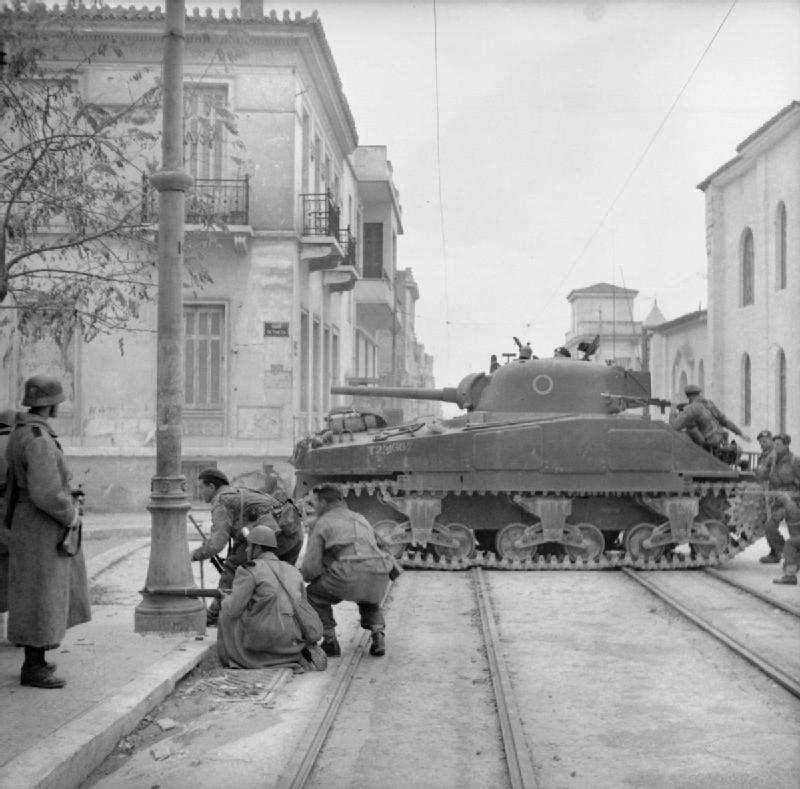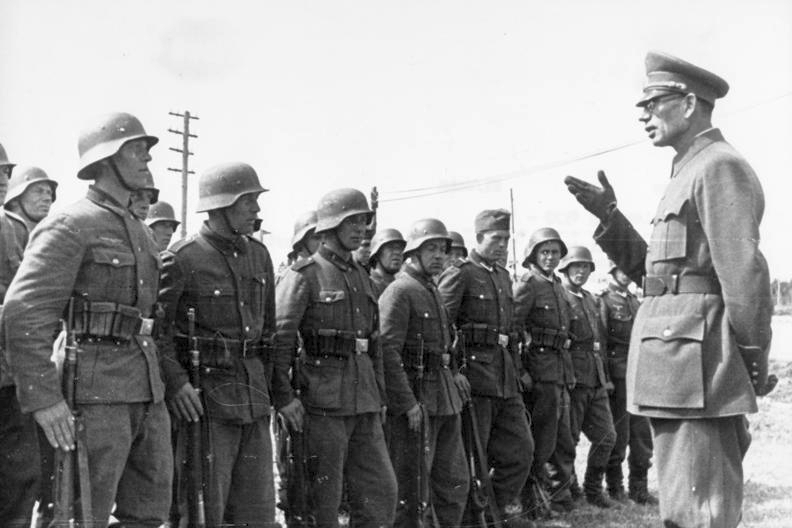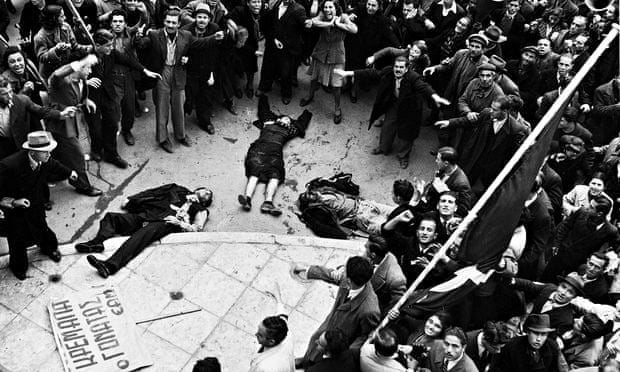77 years ago, Churchill quietly armed Nazi collaborators in Greece to help him seize control of the country. On December 3, 1944, British-backed police fired into a crowd of unarmed protesters in Athens. Dekemvriana (Δεκεμβριανά, December events) sparked the White Terror and Greek Civil War.
Background:
In April 1941, Adolf Hitler conquered Greece during the Balkans Campaign. A Greek resistance movement started, and the Nazis went to extreme lengths to stamp it out. Axis soldiers committed vicious reprisals against the local population, including mass rapes and public executions. Roughly 500,000 Greeks died under Nazi occupation.
More than three years later in October 1944, German forces finally withdrew from Greece to avoid being surrounded and destroyed. Greek resistance fighters in the National Liberation Front (incorrectly) believed they were being rescued and allowed British forces under Gen. Ronald Scobie to occupy Athens. In reality, the British had other ideas.
Joseph Stalin in the USSR and Josep Tito in Yugoslavia both mostly accepted the idea of Greece falling into the British sphere of influence. Now with Hitler almost defeated, Churchill dreamed of taking his place and reestablishing the British Empire as a world power. To help accomplish this goal in the Balkans, Churchill planned to reinstall the exiled monarch, King George II. But Churchill had a problem. A large majority of people in the Greek resistance had no interest in replacing one tyrant for another, they wanted a republican government. Fortunately for Churchill, he had a fairly large group of loyal allies in the local population: Nazi collaborators.
Churchill and his minions were in a complicated position. They wanted power, but they had to be careful about openly siding with Nazis before Hitler was even defeated, and massacring the people Great Britain was supposedly trying to liberate.
The Killing Starts
Gen. Ronald Scobie and Georgios Papandreou, regent of the king and effective head of the Greek puppet government, decided which militias could be trusted, mostly monarchists, right-wing nationalists, and (of course) Nazi collaborators, and ordered everyone else to disarm. Many people weren’t happy with this idea and took to the streets to protest. Two days later on December 3, Greek police fired into a crowd of demonstrators in Athens, killing 28 and wounding many more. The situation quickly deteriorated into open warfare.
At first, pro-government forces were outnumbered and pushed into the center of the city. They were only saved by thousands of British reinforcements, including tanks and heavy artillery. British soldiers slaughtered the local population with the same enthusiasm as the Nazis before them, deliberately targeting the working-class Athenian neighborhoods for destruction. They even put snipers on top of the Acropolis, knowing that people would be hesitant to shoot back out of fear of destroying the monument. Even the Nazis hadn’t been willing to do that.

Interestingly, during the monthlong battle for Athens, there was very little fighting in the rest of the country. This could have been caused by a number of factors. Maybe poor communications, internal rivalries within the resistance, or maybe people were simply unwilling to subject their country to yet another holocaust.
Whether they liked it or not, a second holocaust came anyway. The Greek Civil War erupted. Greece was once drowning in blood. Churchill’s fascist allies spared no brutality, executing resistance fighters and putting their heads on stakes. British voters back home were concerned by the viciousness of Greek Nazis, but Churchill’s government explained that putting heads on spikes was just a peculiar “local custom” in Greece.
Aftermath
Pro-West forces eventually won in 1949, but at a terrible cost. Almost 200,000 people were killed, and Greece was left in ruins. Hundreds of thousands more people were tortured, raped, exiled, or sent to slave labor camps. The social divisions caused by prolonged civil war were arguably even worse. Greece was plagued by internal strife and frequent regime changes for decades afterward. It also doesn’t help that colonialism in Greece never really ended. Greece joined NATO in 1952 and has been a pawn of Cold War politics ever since.
Like Greece, most of Europe remained under the control of Nazi leaders and administrators, including West Germany. Nazis and high-ranking officials in Hitler’s regime were safeguarded and groomed for the highest positions in the Cold War oligarchy. Nazi war criminal Adolf Heusinger became West Germany’s first chancellor and even served as Chairman of the NATO Military Committee.
For Greece, World War II ended in irony. German atrocities were simply replaced by British atrocities.
WWII ended in irony for Churchill too. The only difference between Hitler and Churchill was that Hitler was strong and Churchill was weak. Despite the millions of deaths around the world he personally caused, Churchill’s genocidal ambitions went mostly unrealized. His party was crushed in the first post-war election in July 1945. British voters were tired of dying for their leader’s sick personal fantasies. The British Empire was systematically dissolved and there was nothing Churchill could do about it.
Even Churchill’s plan to create a new Nazi coalition against the Soviet Union didn’t work out the way he wanted it to. The Soviets caught on to what he was doing and bullied him into sending most of his new friends back home (See Operation Keelhaul as one example of forced repatriation of… “anti-communists”).

The Tyrant
Churchill was willing to commit any crime, kill any number of people, and ally with anyone (even Nazis) to save the British Empire. But it was all for nothing. The sheer brutality of his reign of terror might have been partly due to desperation as well as pragmatism. When he attended the Tehran conference in 1943, Churchill was painfully aware of just how weak his “empire” was in comparison to the other world powers.
…the great Russian bear on one side of me, with paws outstretched, and on the other side the great American buffalo, and between the two sat the poor little English donkey who was the only one who knew the right way home.
-Winston Churchill
One peculiarity about Churchill is that his biggest critics are not on the political left like one would naturally think, but on the political right. Perhaps his most fascinating critic is Pat Buchanan, a personal friend of Richard Nixon and (briefly) Ronald Reagan’s White House Communications Director. In his book Churchill, Hitler, and the Unnecessary War, Buchanan argued that Hitler genuinely wanted Poland as an ally but was forced to invade because the Polish government was being greedy and stupid.
Buchanan specifically blamed Neville Chamberlain for assuring Polish independence and declaring war on Hitler, and also blamed Churchill for turning down Hitler’s offers of a truce. He also, correctly, pointed out that Churchill was just as much of an asshole as Hitler, and the strategic air bombing of Germany and Japan was genocide and there’s no other word for it. Buchanan even went so far as to claim Hitler wanted the war to end in 1940, and wouldn’t have invaded the Soviet Union at all if the British hadn’t endlessly provoked him.
I cannot assess these arguments, as I have admittedly not read the full text of the book, only Buchanan’s inflammatory 2009 article that was deleted from MSNBC (you can read it here). I don’t think he was personally defending Hitler. Also bear in mind that Buchanan is a traditional American conservative and an isolationist. He’s not a fascist. I don’t think it is even accurate to accuse him of being a fascist sympathizer. He’s apparently unhappy that the USA keeps getting dragged into European wars, so it is reasonable for him to ask why that keeps happening.
But I do think that Buchanan is playing the court jester here. He’s willing to say uncomfortable truths that people don’t want to hear. Let’s be honest with ourselves. It’s not possible to know what Hitler would or wouldn’t have done in an alternate universe, but Buchanan is absolutely correct in saying that Churchill was just as evil as Hitler was. As I said above, I haven’t read his book and didn’t even read his article until just tonight while I was writing this story. Put emotion aside and listen to what he’s saying.
Now for all the liberal writers howling that Buchanan is wrong. Can you actually elaborate on why he’s wrong, instead of just calling him a bunch of silly names, like in this Huffington Post article?
Back to Churchill. Let’s look at the situation from the other side of the table. I’ve talked to several Russian commentators about their viewpoints of the events leading up to WWII, and have consistently gotten the same answer. Stalin offered to intervene in Poland if, and only if, the Western allies helped him. They refused. Even Poland(!) refused. The 1939 Soviet military didn’t stand a chance in a unilateral offensive war against Germany, so they resigned themselves to entering Poland two weeks later and gobbling up what they could to keep it out of Hitler’s hands.
Combining Buchanan’s claims with the Russian perspective paints an interesting picture. The Nazis wanted a coalition, the Soviets wanted a coalition, and the British were playing both sides for their own benefit. I don’t find it unreasonable at all for Buchanan to suggest that Hitler might have been less aggressive if he wasn’t constantly worried about the Brits planting a knife in his back. And no, this doesn’t mean Buchanan likes Hitler. Is it a good idea to egg a serial killer’s house? Just like it’s not a good idea to deliberately provoke a serial killer, it probably wasn’t a good idea to provoke Hitler either.
I also don’t find it unreasonable for Buchanan to suggest that it would have been better for the world if the holocaust had stayed inside Germany and never expanded past its borders. And yes, I do have to agree with Buchanan – and the Soviets – on this one. I don’t think it is morally abhorrent to make a truce with a foreign dictator. The USA has spent the last 75 years playing world policeman. How’s that worked out? Did it save lives? Let’s ask the Iraqis. Or the Koreans, Vietnamese, Serbs, Libyans, Iranians, Somalians, Syrians…
Now if a truce with Hitler would have been that bad, why didn’t the plucky British freedom fighters just side with the Soviets when they had the opportunity? They didn’t because that would have required picking a side, and the empire has only ever been in the game for themselves. Morality has never entered the equation.
I wonder if Churchill is sitting in hell right now regretting his choices.
Further Reading
The Green Left: The White Terror in Greece
The Guardian: Athens 1944: Britain’s Dirty Secret
The Percentages Agreement (Wikipedia)
Ian Kummer

All text in Reading Junkie posts are free to share or republish without permission, and I highly encourage my fellow bloggers to do so. Please be courteous and link back to the original.
I now have a new YouTube channel that I will use to upload videos from my travels around Russia. Expect new content there soon. Please give me a follow here.
Also feel free to connect with me on Quora (I sometimes share unique articles there).


